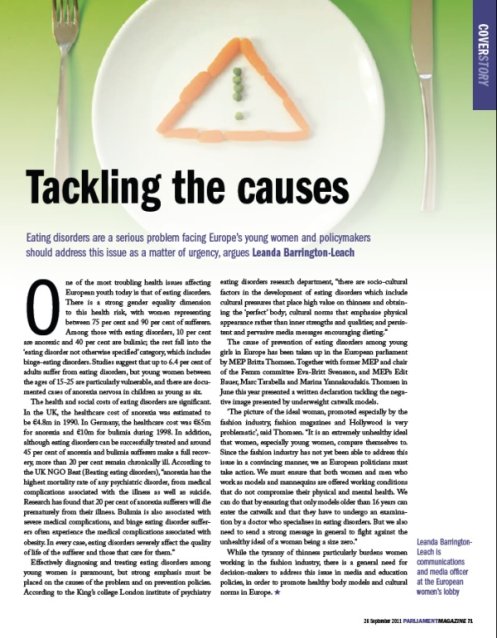Tackling the causes
Parliament Magazine, 26 September 2011
Eating disorders are a serious problem facing Europe’s young women and policymakers should address this issue as a matter of urgency, argues Leanda Barrington-Leach.
One of the most troubling health issues affecting European youth today is that of eating disorders. There is a strong gender equality dimension to this health risk, with women representing between 75% and 90% of sufferers. Among those with eating disorders, 10% are anorexic and 40% are bulimic; the rest fall into the ‘Eating disorder not otherwise specified’ category, which includes binge-eating disorder. Studies suggest that up to 6.4% of adults suffer from eating disorders, but young women between the ages of 15 and 25 are particularly vulnerable, and there are documented cases of anorexia nervosa in children as young as six.
The health and social costs of eating disorders are significant. In the UK, the healthcare cost of anorexia was estimated to be £4.2 million in 1990. In Germany, the healthcare cost was €65 million for anorexia and €10 million for bulimia during 1998. In addition, although eating disorders can be successfully treated and around 45% of anorexia and bulimia sufferers make a full recovery, more than 20% remain chronically ill. According to the UK NGO Beat (Beating eating disorders), ‘anorexia has the highest mortality rate of any psychiatric disorder, from medical complications associated with the illness as well as suicide. Research has found that 20% of anorexia sufferers will die prematurely from their illness. Bulimia is also associated with severe medical complications, and binge eating disorder sufferers often experience the medical complications associated with obesity. In every case, eating disorders severely affect the quality of life of the sufferer and those that care for them.’
The importance of effectively diagnosing and treating eating disorders among young women is paramount, but strong emphasis must be placed on the causes of the problem and on prevention policies. According to the King’s College London Institute of Psychiatry Eating Disorders Research department, ‘there are socio-cultural factors in the development of eating disorders which include cultural pressures that place high value on thinness and obtaining the ’perfect’ body; cultural norms that emphasise physical appearance rather than inner strengths and qualities; and persistent and pervasive media messages encouraging dieting.’
The cause of prevention of eating disorders among young girls in Europe has been taken up in the European Parliament by Britta Thomsen MEP (S&D, DK). Together with former MEP and Chair of the FEMM Committee Eva-Britt Svensson (GUE/NGL, SE), Edit Bauer (EPP, SK), Marc Tarabella (S&D, BE), Marina Yannakoudakis (ECR, UK), Ms. Thomsen in June this year presented a Written Declaration tackling the negative image presented by underweight catwalk models.
‘The picture of the ideal woman, promoted especially by the fashion industry, fashion magazines and Hollywood is very problematic’, comments Ms. Thomsen. ‘It is an extremely unhealthy ideal, that women - especially young women - compare themselves to. Since the fashion industry has not yet been able to address this issue in a convincing manner, we as European politicians must take action. We must ensure that both women and men who work as models and mannequins are offered working conditions that do not compromise their physical and mental health. We can do that by ensuring that only models older than 16 years can enter the catwalk and that they have to undergo an examination by a doctor who specialises in eating disorders. But we also need to send a strong message in general to fight against the unhealthy ideal of a woman being a size zero.’
While the tyranny of thinness burdens particularly women working in the fashion industry, there is a general need for decision-makers to address this issue in media and education policies, in order to promote healthy body models and cultural norms in Europe.
By Leanda E. Barrington-Leach, Communications & Media Officer, The European Women’s Lobby
Please click on the image to download this article in PDF format.





